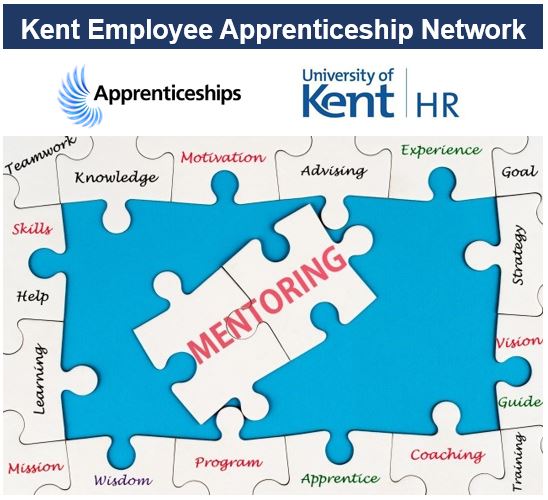Apprentices at Kent need your expertise to develop their knowledge and skills of their occupation whilst they undertake an Apprenticeship as part of their career development.
There is a huge range of existing employees undertaking an Apprenticeship that would benefit from your time, knowledge and expertise, in roles across Kent.
What is an Apprentice mentor?
A mentor is a guide who can help the Apprentice (mentee) find the right direction, develop solutions to day to day issues and work for their Apprenticeship standard. Mentors rely upon having had similar experiences to gain empathy with the mentee and an understanding of their issues. Mentoring provides the mentee with an opportunity to think about options and to progress.
Mentors can provide wise counsel, information, advice and guidance relating to the learning and training aspects of the Apprenticeship and how this works at Kent.
We are particularly looking for mentors with experience of team leading, supervisory, management, leadership, digital skills, marketing, accounting and finance.
How can mentoring help apprentices using the levy funding?
Mentoring is particularly important for apprentices as they are often young people entering the workplace for the first time. The mentor relationship provides additional support, guidance and pastoral care, which is removed from the apprentice’s direct line management chain.
The same can also be said and applied to anyone from new and existing staff that access the levy to undertake development by completing an Apprenticeship standard. A mentor is needed to support and coach you to develop new and existing skills, knowledge and experience.
Who would make a good mentor?
Ideally, a mentor should be a member of the team the Apprentice works with or someone experienced in a similar role, as they will have training and experience and will need a range of skills including; active listening, questioning, building rapport, offering constructive feedback (both positive & negative) offering support and guidance, signposting and to act as a role model.
What will I need to do?
Draw on Your Own Experience
Being an apprentice is a steep learning curve as they have a lot to learn about their job and working here at Kent. Think back to when you first started your job and what you found difficult, or wanted to know. The most useful thing you can offer is practical examples of how you overcame obstacles, or developed your skills and confidence as an apprentice.
Listen to Them
Try and put yourself in the shoes of the apprentice you are mentoring and remember how you felt at the time. However, everyone is different and this apprentice may think and deal with things in their own way. You need to open your ears and really listen to what they have to say, their concerns and their areas of weakness.
Learn From Them
Being a mentor is a two-way process. Not only does it greatly help the person you are mentoring, but you can also gain a lot from the experience. When you have been in the role for a while it is easy to become blinkered and working with a new recruit can help give you a fresh perspective on the work, your attitude and your working relationships.
Be Open and Available
In your role as a mentor is it important that you are committed to making time for the apprentice and being there when they need you. Setting regular meetings but also being willing to be contacted in between. While you may need to set boundaries, you will both get much more out of the relationship if you are open and available.
Monitor Progress
You may decide that you want to monitor progress in a formal way, or just through informal chats. Either way, it is important you help the apprentice move forward. By setting goals or measuring progress, you will be able to see the tangible impact that you are having.
Being a mentor is a very rewarding role and as well as playing a key part in the life of the apprentice, it can also help you look at your own career path. You need to take the commitment seriously and be open and available to your mentor when they need you. Make sure that you listen to their concerns, learn from them and use your own experience to help them develop as an apprentice.
Would you like to know more, or can offer you help and support? Contact Loretta Izod, your Employee Apprenticeship Manager
email L.J.Izod@kent.ac.uk ext 16568

Follow the Learning & Organisational Development (L&OD)Team for our regular posts, all things Apprenticeship and L&OD on our
Twitter @UoKLDev and Instagram Unikentlearndev accounts

